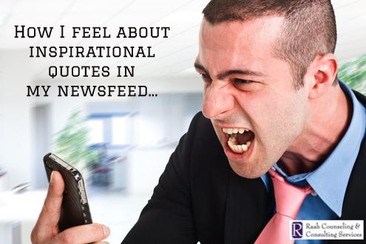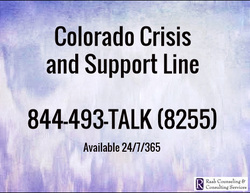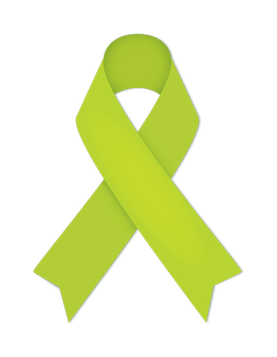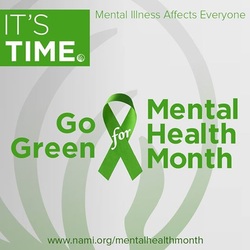 Not really. Okay, Maybe a little…. I’ve been thinking a lot lately about the inspiring quotes I post on my Facebook page. In addition to the ones I post, I see at least twenty mantras and positive affirmations online every day. Some of them give me warm fuzzies, make me laugh or make me think about something differently. Sometimes, however, they just annoy me. The “don’t worry, be happy” brand of attitude sometimes grates on my nerves (sorry Bobby McFerrin). Noticing my own shifting attitude toward mantras and affirmations, I began to wonder.... “do these actually help people who are feeling sad, anxious or bad about themselves?" "are parents the parents I want to reach actually inspired by these quotes?" "do teens reading my page think these affirmations are all a bunch of BS?" I began doing some reading on the value of positive self-talk and affirmations and have found mixed reviews. In fact, some of the research seems to match my “sometimes I like it, sometimes I don’t” feelings. Here are a few articles I came across from Psychology Today and The Emotion Machine. One thing the research seems to say is that mantras/affirmations can be helpful to people experiencing depression, anxiety, stress and other distressing situations. This is particularly true if they are used consistently and combined with counseling or coaching services. It is this last piece that is missing with the flood of mantras and positive affirmations that are floating around all over the internet. I am a counselor and, to be honest, I talk with many of my clients about what to do with the barrage of negative thoughts many of them experience. My goal is to add a bit more meat to the affirmations and mantras I post to help them be more meaningful. While this is not intended to replace formal counseling or therapy, I’m hoping it will help some of the smiley faced mantras and quotes speak to you. What do you think about positive affirmations, inspiring quotes and mantras? What is your favorite (or least favorite) quote or saying? I’d love to know and maybe I'll feature it - and you - on an upcoming blog post!
54 Comments
 844-493-TALK (8255) 844-493-TALK (8255) On August 12, 2014, the Colorado Crisis and Support Line opened its doors. This new statewide crisis hotline is open to anyone in Colorado who needs emergency mental health assistance or is seeking extra support. All callers can expect to speak to a trained mental health professional. Phones are answered 24 hours a day, 365 days a year. The crisis line phone number is 844-493-TALK (8255) You do not need to live in Denver to use the hotline! It is available to EVERYONE in Colorado! The crisis line advocates can assist callers with a variety of personal and mental health emergencies. Here are a few reasons you might call the hotline:
Please, if you need immediate assistance with a life-or-death situation, call 911 or go to your nearest emergency room. The hotline is run by the Colorado Department of Human Services (CDHS) and Metro Crisis Services. Click here to read the CDHS press release on the opening of the crisis line. Bethany Raab is a Licensed Clinical Social Worker in Denver, Colorado.
 A quick look at the trending topics on Google today looked something like this:
Honestly, my first thought after looking at this list was “Yay!” Two science fiction shows made the trending topics list!" My second thought was “Wow, this is completely focused on famous people and celebrity events. Where are the stories about normal people and regular, everyday life?” Soon I found myself pondering how easy it can be to lose ourselves in the flurry of media coverage about the glamorous and extravagant lives of celebrities – actors and athletes alike. How one can be satisfied living a “normal” or “average” life when the lifestyles of the rich and famous are constantly bombarding our online world? Here are some of my thoughts:
Give these a try. My bet is that your life will be so satisfying that you won’t have time to worry about the most recent celebrity news nor will you yearn as much for their extravagant lifestyle. You will have your own full and beautiful life! Bethany Raab is a Licensed Clinical Social Worker in Denver, Colorado.
Welcome back to my blog series in honor of May being designated Mental Health Awareness Month. If you haven't already, you can click below to read parts one and two. Please read and share with your network to help spread awareness about mental illness and mental health care! Mental Health Awareness Month: Myths and Facts, Part 1 Mental Health Awareness Month: Myths and Facts, Part 2 Myth #4: Mental health treatment does not work. Fact: Mental health treatment does work and it can help you! Research is being done around the world on various types of therapy. This research is important, especially because it has given us what are called “evidenced base models” of therapy. What this means is that valid, scientific research proves that certain kinds of therapy do work! Several models used by therapists around the United States are evidenced based and widely used. These include but are not limited to: Acceptance and Commitment Therapy (ACT), Cognitive Behavioral Therapy (CBT), Dialectical Behavior Therapy (DBT), and Eye Movement Desensitization and Reprocessing (EMDR). Do not hesitate to ask a potential therapist about what models of therapy they use in their practice and whether or not it is evidenced based. You can click on any of the models listed above to learn more. Click here to view a guide about evidenced based models. Of course, it is possible for you to see a great therapist who does evidenced based work and not see much benefit. The key to therapy being helpful is not only having a skilled and trusted therapist but YOU! I once heard this in a training presented by my colleague Brenda Bomgardner: There are 168 hours in a week. If you spend 1 of those hours in therapy and the other 167 hours ignoring or forgetting what you learned, therapy may not be very effective. Therapy can be hard. Therapy asks a lot of the client, but it is worth it! Myth #5: If I go to therapy, I will have to take medication. Fact: Many mental health problems can be successfully treated with only therapy. Some mental illnesses are best treated with a combination of medication AND therapy. It is important to note that most therapists cannot prescribe medication, as most of us do not have medical training. Therapists who are trained as social workers, counselors, or psychologists are not allowed to give medical advice as it is out of our area of expertise. If you begin therapy, a counselor or therapist might recommend you see a doctor to consider medication. If this happens and you choose to follow the recommendation, you will need to schedule an appointment with a medical doctor. Some general practitioners may be willing to prescribe medications for certain mental health reasons. You may also prefer or need to see a psychiatrist, depending on your individual situation. These professionals are medical doctors who are specifically trained to provide medication and, sometimes, therapy to care for mental illnesses. Your therapist and your doctor will work together with you to determine which path is best for you and your needs. Here is my next challenge to you: Do a quick online search of therapists in your area. See who is out there and take a look at the models of therapy they provide. Choose one to learn more about and take time to read at least one article. It is good to be informed! Check back tomorrow for a bonus post on self-care! Bethany Raab is a Licensed Clinical Social Worker in Denver, Colorado.
 Welcome to Part 2 of my blog series focused on common myths about mental illness! Click here to read Part 1. In honor of May being Mental Health Awareness Month, I am sharing my thoughts on some common myths about mental illness and mental health treatment. This is the second of a 4 part series for the month of May. My goal is to help you better understand mental illness and to share ideas on how to get help if necessary. Please share with anyone who might benefit from this information! Here we go! Myth #2: Mental health treatment is not available in my area. Fact: Mental health treatment is available. To be fair, I work in a metropolitan area that is saturated with mental health professionals. Here, as in other urban areas, one can easily find a large network of social workers, counselors and therapists. If you live in a smaller, more rural area, don’t assume you cannot get help! While you may have fewer options to choose from, help is available. Talk with your primary care physician, pediatrician, local hospital, nearby university/college or someone at your child’s school for guidance or referrals. You can also search online through therapist profile listings such as Psychology Today* or Good Therapy*. Additionally, some agencies and therapists in larger cities offer their services by phone or online video conferencing to serve people in more remote areas. Myth #3: Mental health treatment is too expensive. Fact: Mental health treatment can be affordable. Yes, seeing a therapist can be pricey, but consider what you could gain by spending some time with a trained professional whose priority is to help you through difficult, stressful times. Mental health treatment is an investment in your well-being and your future! However, if the full rates in your area are still more than you can afford, you have options. Often, private therapists accept insurance plans or offer a sliding scale. Many states and counties offer community mental health services that are reduced fee or covered by insurance. (Check out the Colorado Behavioral Health Council to learn more about community mental health services in Colorado.) Another option is to see if your employer offers a benefit known as Employee Assistance Services (EAP). Many people assume EAP services are used only if you are in trouble at work and required to seek counseling. This is only the beginning of what an EAP provides! Employees with EAP benefits can typically access between 2 and 10 free (yes, FREE!!) counseling sessions depending on the specific benefit package. These sessions may be used for any issue you or your family may be experiencing. EAP therapists can often continue seeing you for their typical fee (or maybe even a reduced rate) after your benefits are used. They can also help you find another provider if necessary. Here is another challenge for you: Do a search on your insurance company's website and see how many therapists are available in your area. Also, find out if your employer provides EAP benefits and what those benefits include. Why do this challenge? Consider it an opportunity to educate yourself on your own resources! Check back tomorrow for Part 3 of this series! * I am not sponsored by Psychology Today or Good Therapy and do not benefit in anyway by including these company names in my blog. Their inclusion is simply meant to be informative. Other therapist finder websites exist and can easily be found through a basic web search. Photo from Flickr. Creative Commons. Some rights reserved by FaxPilot. Bethany Raab is a Licensed Clinical Social Worker in Denver, Colorado.
 Did you know that 1 in 4 American adults experiences mental illness every year? Or that 20% of children ages 13 to 18 experience mental health problems in any given year? (National Alliance on Mental Illness) May has been designated “Mental Health Awareness Month” in order to bring awareness to mental illness in America. In my years as a social worker, I have heard many people speak about mental illness as something to be kept secret. Some people are ashamed that they are not well and hesitate to seek help as a result. In honor of Mental Health Awareness Month, I will be discussing 5 myths about mental illness and seeking mental health care. I will also include a bonus post about self-care. This is the first of a 4 part series to be posted throughout the remainder of May. My goal is to help you better understand mental illness and mental health treatment, as well as to offer some ideas on how to get help if necessary. Please share with anyone who might benefit from this information! Here are the topics I will cover over the next 10 days:
Let's get started. Myth #1: Mental illness means I am crazy and will always be crazy. Not so. Crazy is a word often applied with little concern or compassion for those experiencing mental illness. I do not believe having any sort of mental illness makes you "crazy." I believe it means you are facing a challenge that can be managed and often overcome with time, patience, hard work, support and professional help. My challenge to all of my readers is to watch your language. No, I'm not talking about swearing or anything along those lines. What I am asking is that you observe how often you use the word "crazy" to describe someone. Unfortunately, it has become socially acceptable to label someone behaving in an odd or out of control manner as being "crazy" rather than acknowledging they may be dealing with mental illness. Let's change this bad habit and practice acceptance instead. Learn more by reading the rest of the series! Mental Health Awareness Month: Myths and Facts, Part 2 Mental Health Awareness Month: Myths and Facts, Part 3 Mental Health Awareness Month: Bonus Post! Bethany Raab is a Licensed Clinical Social Worker in Denver, Colorado.
"Make each day your masterpiece." This quote by John Wooden is resonating with me today, bringing to mind the idea that every day is a piece of the bigger picture of your life. This has led me to ponder several questions: What does this idea mean for those days that are stressful, difficult or just downright bad? Do the bad periods take away from the overall picture or beauty of your life? How can you persevere through the hard days? See below for my thoughts! Everyone has tough days. For a teen, a big test, friendship problems or a relationship ending could lead to a bad day. For a parent, feeling stressed about work, worrying about their children or simply being tired may lead to a difficult day. Whatever the cause, bad days can seem overwhelming and can often be filled with strong emotions. So what can you do if you are having a bad day today? Here are a few ideas: 1) Remember that today will end. I know this sounds cliche, but it can be helpful to remember that the sun will set, even on the hardest of days. Tomorrow is a new day. 2) Remember that strong emotions will pass. Part of what makes humans unique among all other species is our ability to experience emotions. Strong feelings, including anger and sadness will pass. Rather than bottle these emotions up, find a healthy way to express them outwardly. Talk to a friend or parent, write, draw, run or sing it out. You will feel better in the long run if you do not ignore your emotions. 3) Remember to take care of yourself. If you are experiencing a stressful time, remember to prioritize your well-being. Does spending time with friends make you feel good? Make plans together. Does exercising help you feel calm? Go for a walk or make it a point to hit the gym. Does the idea of attending another activity make you feel exhausted? Politely decline the invitation. Does taking a bath or reading help you feel calm? You get the idea. The most important thing is to make time for YOU! 4) Remember to look for the good. Find something to be grateful for every day. Purposefully seeking out the positive can help counteract negative thoughts. Write things you are grateful for down in a journal so you can be reminded of them during difficult times. 5) Remember the big picture. Your life is an incredible and special piece of art. In the end, the mixture of good and difficult times will serve to make your story uniquely yours and more beautiful than you can imagine! Please, share your thoughts on this topic! What can you do today to make today a part of your masterpiece? Bethany Raab is a Licensed Clinical Social Worker in Denver, Colorado.
Every parent wants their daughter to feel good about herself. We live in a society that places increasing focus on women's bodies. It is important to be mindful about social pressures in your interactions with your daughter. Use positive language and help her feel confident! See below for 10 specific ways to help your daughter love her body! This post originally appeared on the Wasatch Family Therapy Blog.
I have noticed a recent increase in conversations on social media regarding parents' choice to vaccinate their children and concerns that vaccinations can cause autism. Specifically, a 2011 NPR article titled Study Linking Childhood Vaccine And Autism Was Fraudulent has resurfaced, sparking fervent discussion about vaccinations. Dr. Andrew Wakefield, a British physician, and his colleagues published studies in 1998 and 2002 linking the measles, mumps and rubella (MMR) vaccine to autism. The studies were published in The Lancet which is self-described as "the world's leading general medical journal and specialty journals in Oncology, Neurology and Infectious Diseases." The publication officially retracted the studies in 2010 after discovering that the studies were fraudulent. See this NPR article which links to the official retraction from The Lancet. Click here for an article from the American Academy of Pediatrics outlining the original Wakefield studies and the specific flaws of each. I am interested in hearing from my readers on this topic. Here are some specific questions to get the discussion started:
Please comment with your thoughts! *The author of this article is not a medical professional and is not authorized to provide medical advice. The purpose of this article is to encourage discussion on the decision-making process used by the public to determine whether or not to vaccinate children. No medical advice will be given in response to comments. Please contact your doctor with specific medical concerns about vaccines, autism and/or the health of your children. Bethany Jones Raab is a Licensed Clinical Social Worker in Denver, Colorado.
|
Welcome!
Every blog post you see on this page is written especially for teens and their parents! Like it? Pin it!
Follow me!
Categories
All
|



 RSS Feed
RSS Feed